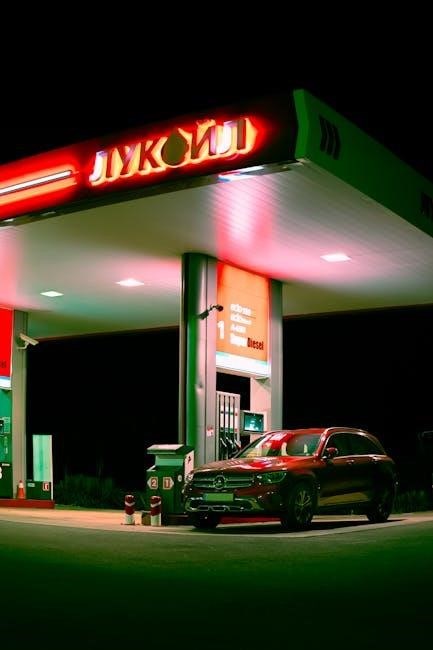International Fuel Gas Code (IFGC): Overview
The International Fuel Gas Code (IFGC) establishes the minimum requirements for fuel gas systems and gas-fired appliances through both prescriptive and performance-related provisions. It provides a comprehensive set of regulations for these systems.
Purpose of the IFGC
The primary purpose of the International Fuel Gas Code (IFGC) is to provide a baseline standard for the design and installation of fuel gas systems and gas-fired appliances. It aims to ensure safety and efficiency in the utilization of fuel gas. The IFGC establishes minimum requirements through prescriptive and performance-related provisions, allowing for the use of new materials and designs while maintaining a safe environment.
By setting these standards, the IFGC protects public health, safety, and welfare by reducing the risks associated with fuel gas systems and appliances. It offers a comprehensive set of regulations that cover various aspects, from installation to venting, ensuring that all components work together safely and effectively. The code serves as a foundation for many state and city codes, often with local amendments, to meet specific regional needs.
Scope of the IFGC
The International Fuel Gas Code (IFGC) encompasses a broad scope, primarily addressing the design and installation of fuel gas systems and gas-fired appliances. It provides detailed regulations for various elements, ensuring comprehensive coverage. This includes the installation of fuel gas distribution piping, appliance venting systems, and the appliances themselves. The code aims to establish uniformity and safety standards across different jurisdictions.
Furthermore, the IFGC’s scope extends to the materials used in fuel gas systems, setting requirements for their performance and compatibility. It outlines specifications for connecting appliances, venting systems, and ensuring proper combustion air. The code also addresses safety measures, such as overpressure protection and leak detection. By covering these aspects, the IFGC serves as a critical resource for safe and efficient fuel gas utilization.

IFGC Editions and Availability
The International Fuel Gas Code (IFGC) is updated regularly, with editions like 2021 and 2024. These editions and older ones can be purchased through the ICC and other distributors.
2021 IFGC
The 2021 International Fuel Gas Code (IFGC) establishes a baseline for the design and installation of fuel gas systems and gas-fired appliances through performance requirements. Key changes include marking the termination of concealed condensate piping. This is to indicate whether it’s the primary or secondary drain.
This edition is fully compatible with all International Codes. The IFGC combined with local jurisdiction amendments forms the state codes. It is founded on broad-based principles that make possible the use of new materials and new fuel gas system and appliance designs.
Jurisdictions adopting the IFGC 2021 include states and cities that use it as the foundation for their fuel gas regulations, sometimes with local amendments. The code addresses the design and installation of fuel gas systems and gas-fired appliances through prescriptive and performance requirements.
2024 IFGC Updates
The 2024 IFGC addresses the design and installation of fuel gas systems and gas-fired appliances through prescriptive and performance requirements. One key change in the 2024 IFGC includes revisions to Appendix D, specifically D105.2, concerning the test for combustion air and vent drafting for natural draft and Category I appliances, existing code language has been deleted.
The 2024 International Codes (I-Codes) have undergone substantial formatting changes. Those viewing the code book via PDF can click on the QR code. All methods take the user to the appropriate section on ICC’s Digital Codes website.
These changes aim to improve clarity and usability for code users in the field. The updates are part of the ICC’s ongoing efforts to ensure the code remains relevant and effective in promoting safety and efficiency.
Previous IFGC Editions (2006, 2009, 2012, 2018)
The IFGC has been updated every three years, with editions released in 2006, 2009, 2012, and 2018, each building upon the last to incorporate new technologies, materials, and best practices. Each edition of the IFGC represents an updated set of regulations for fuel gas systems and appliances.
The 2012 IFGC, legally binding document, maintained and updated the standards for fuel gas installations. Similarly, the 2009 edition continued this trend.
These earlier editions serve as a historical record of code development and can be useful for understanding the evolution of fuel gas safety standards. While not current, they are sometimes referenced in older installations or jurisdictions that have not adopted the latest code.
Where to Purchase the IFGC
The International Fuel Gas Code (IFGC) can be purchased directly from the International Code Council (ICC) through their online store (iccsafe.org). Both digital (PDF) and print versions are typically available. Some jurisdictions, like Seattle, may offer print copies through their local services portal.
Purchasing the IFGC from ICC ensures that you have the complete and official version of the code. This is crucial for compliance and accurate implementation. Be cautious of unofficial or pirated versions, as they may contain errors or omissions. Always refer to the official ICC publication for code requirements.

Key Aspects Covered by the IFGC
The IFGC addresses design, installation of fuel gas systems, and gas-fired appliances through prescriptive and performance requirements. It includes regulations for venting systems to ensure safety and efficiency.
Design and Installation of Fuel Gas Systems
The International Fuel Gas Code (IFGC) provides detailed guidelines for designing and installing fuel gas systems to ensure safe and efficient operation. These guidelines cover various aspects, starting from the selection of appropriate materials for piping and fittings, considering factors like pressure ratings and compatibility with the type of fuel gas being used. The code also specifies requirements for pipe sizing, ensuring that the system can deliver an adequate supply of gas to all connected appliances.
Proper installation techniques are crucial, and the IFGC outlines procedures for joining pipes, supporting them adequately, and protecting them from physical damage. Leak testing protocols are also specified to verify the integrity of the installed system before it is put into service, minimizing the risk of gas leaks and potential hazards. The code emphasizes safety throughout the entire process.
Gas-Fired Appliances Regulations
The International Fuel Gas Code (IFGC) sets forth comprehensive regulations for the installation and operation of gas-fired appliances to ensure safety and efficiency. These regulations cover a wide range of appliances, including furnaces, water heaters, and cooking appliances, outlining specific requirements for their installation, venting, and maintenance.
The IFGC addresses proper appliance connections to the fuel gas supply, ensuring that they are secure and leak-free. It also specifies clearances around appliances to prevent overheating and fire hazards. Venting requirements are particularly important, as the code dictates how combustion byproducts must be safely exhausted to the outdoors to prevent carbon monoxide poisoning. Furthermore, the IFGC includes provisions for appliance safety controls, such as shut-off valves and flame sensors, which are designed to prevent gas leaks and explosions. These regulations aim to minimize risks.
Venting Systems
The International Fuel Gas Code (IFGC) places significant emphasis on venting systems, crucial for safely expelling combustion byproducts from gas-fired appliances. Proper venting prevents the accumulation of harmful gases like carbon monoxide, protecting building occupants. The IFGC outlines specific requirements for vent materials, sizes, and configurations based on the appliance type and its input rating.
The code addresses various venting methods, including natural draft, forced draft, and direct vent systems, detailing installation practices for each. It specifies requirements for vent termination, ensuring that exhaust gases are discharged away from building openings and potential sources of ignition. The IFGC also covers vent connectors, which link appliances to the venting system, dictating their material, slope, and support. Regular inspection and maintenance of venting systems are essential for continued safe operation, and the IFGC provides guidance on these aspects as well, ensuring safety.
Adoption and Enforcement
The IFGC serves as a model code, and its adoption and enforcement are managed by state and local jurisdictions. Jurisdictions may adopt the IFGC in full, or with amendments, making it a legally binding document.
State and Local Jurisdictions Adopting IFGC
Many state and local jurisdictions have adopted the International Fuel Gas Code (IFGC) as the foundation for their regulations regarding fuel gas systems and appliances. These adopting jurisdictions incorporate the IFGC, sometimes with local amendments, into their building codes. Examples of jurisdictions that have adopted the IFGC include states like Alabama, Alaska, Colorado, Florida, and Louisiana, as well as specific counties and cities like Denver, DuPage County, and Wichita-Sedgwick.
The adoption of the IFGC ensures a baseline level of safety and performance for fuel gas systems across these areas, promoting consistency and standardization in construction and installation practices. However, it’s crucial to verify the specific edition and any local modifications within each jurisdiction.
Legally Binding Document Status
The International Fuel Gas Code (IFGC) holds legally binding status once it is adopted by a state or local jurisdiction. When a jurisdiction incorporates the IFGC into its building codes, compliance with its provisions becomes mandatory for all fuel gas systems and appliances within that area. Failure to adhere to the IFGC can result in legal consequences, including fines, project delays, or even the rejection of construction permits.
Citizens and residents are advised that the IFGC is a legally binding document duly incorporated by reference, and failure to comply with its regulations can lead to legal ramifications. It serves as a critical component of the legal framework governing construction and safety.

Important Considerations
When utilizing the IFGC, it’s vital to consider local amendments, as jurisdictions may modify the code. Compliance and preliminary inspections are also key, ensuring all installations meet the required safety standards.
Amendments by Local Jurisdictions
It is crucial to acknowledge that while the IFGC provides a standardized framework, state and local jurisdictions often introduce amendments to tailor the code to their specific needs and conditions. These amendments can address regional variations in climate, construction practices, or local regulations.
Adopting jurisdictions, such as Alabama, Alaska, Colorado, Denver, Florida, DuPage County, Wichita-Sedgwick, and Louisiana, may incorporate their own modifications to the IFGC. Therefore, it’s essential to consult the specific regulations enforced by the local authority having jurisdiction (AHJ) to ensure compliance.
These amendments become legally binding documents within those jurisdictions, supplementing the IFGC’s provisions. Ignoring local amendments can lead to non-compliance and potential safety hazards.
Compliance and Preliminary Inspections
Compliance with the IFGC, along with any local amendments, is paramount to ensure the safe and efficient operation of fuel gas systems. To verify adherence to the code, many jurisdictions conduct inspections throughout the installation process. Preliminary inspections may even be authorized before a permit is officially issued.
These preliminary inspections allow code officials to assess the site and plans, ensuring that the proposed work aligns with the requirements of the IFGC and local regulations. This proactive approach can identify potential issues early on, preventing costly rework and ensuring a smoother permitting process. Ignorance of the law isn’t an excuse for non-compliance.

Resources and Further Information
For comprehensive details, interpretations, and updates regarding the IFGC, the ICC’s Digital Codes website is the best resource. It provides access to code books, interpretations, and other vital information.
ICC Digital Codes Website
The International Code Council (ICC) Digital Codes website stands as the premier online destination for accessing and navigating the International Fuel Gas Code (IFGC). This platform provides users with comprehensive access to the most current versions of the IFGC, alongside a wealth of supplementary resources, including commentaries, interpretations, and amendments.
The website offers a user-friendly interface that allows professionals, code officials, and the general public to easily search, view, and download specific sections of the IFGC. It also features interactive tools, such as code comparisons and annotations, which enhance the understanding and application of the code provisions. Furthermore, users can find valuable information on training programs, certification opportunities, and other resources related to the IFGC.
The ICC Digital Codes website is an indispensable tool for anyone involved in the design, installation, or inspection of fuel gas systems.




